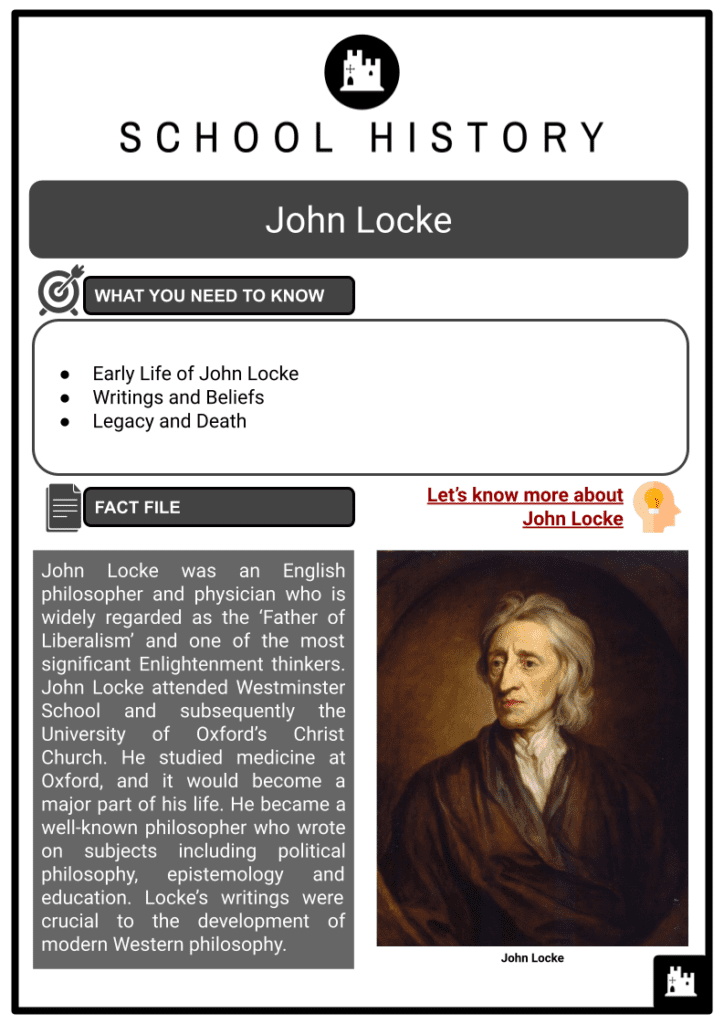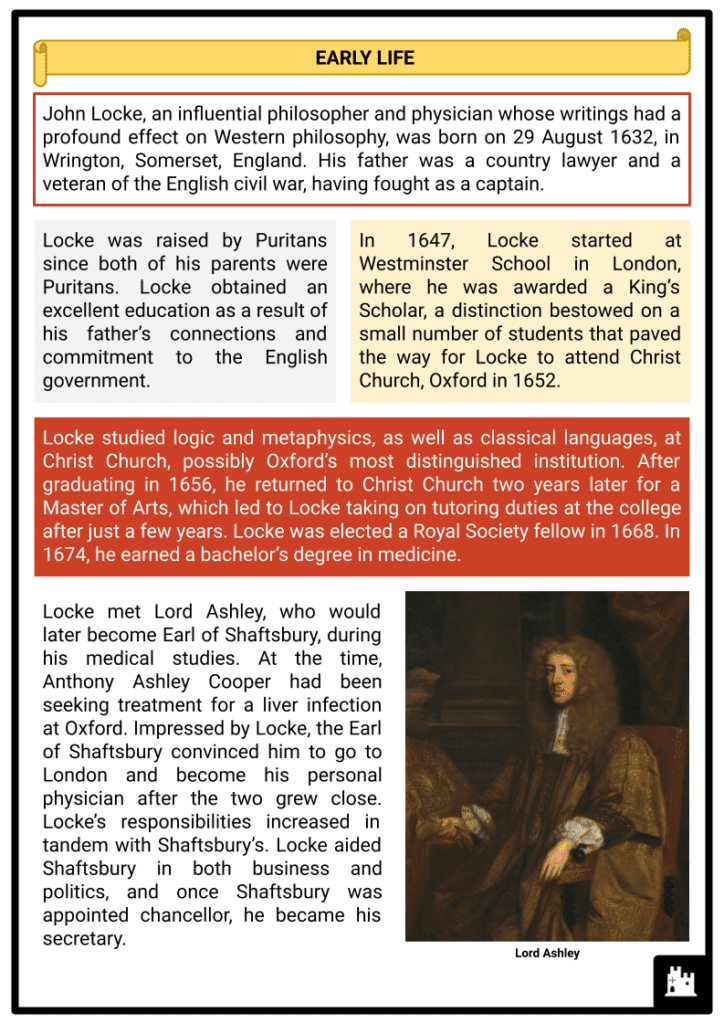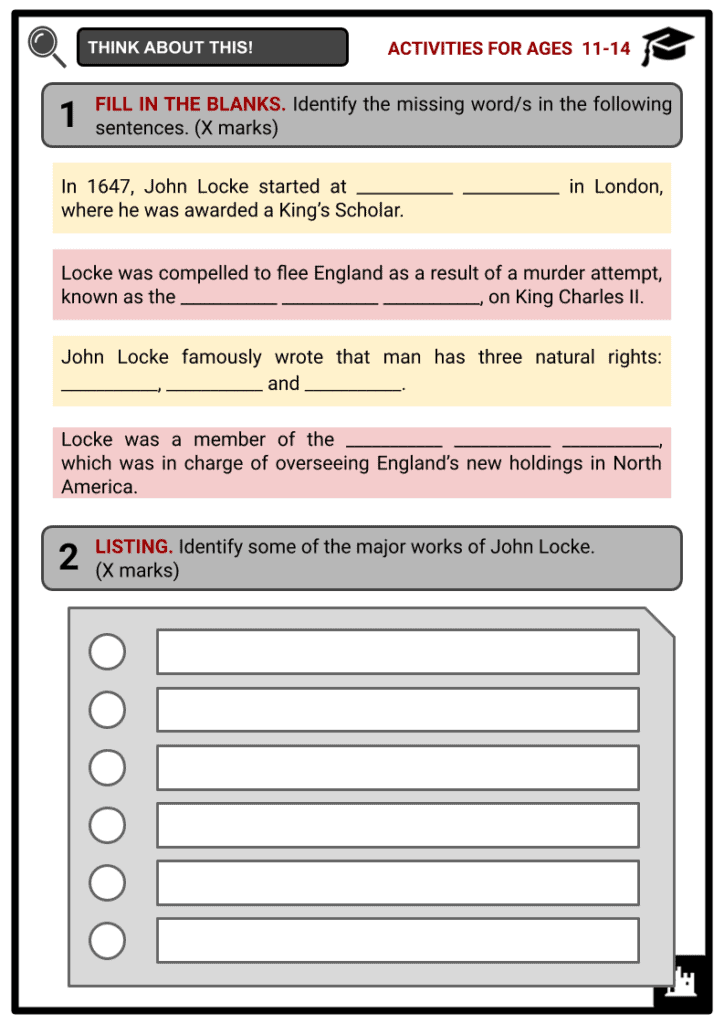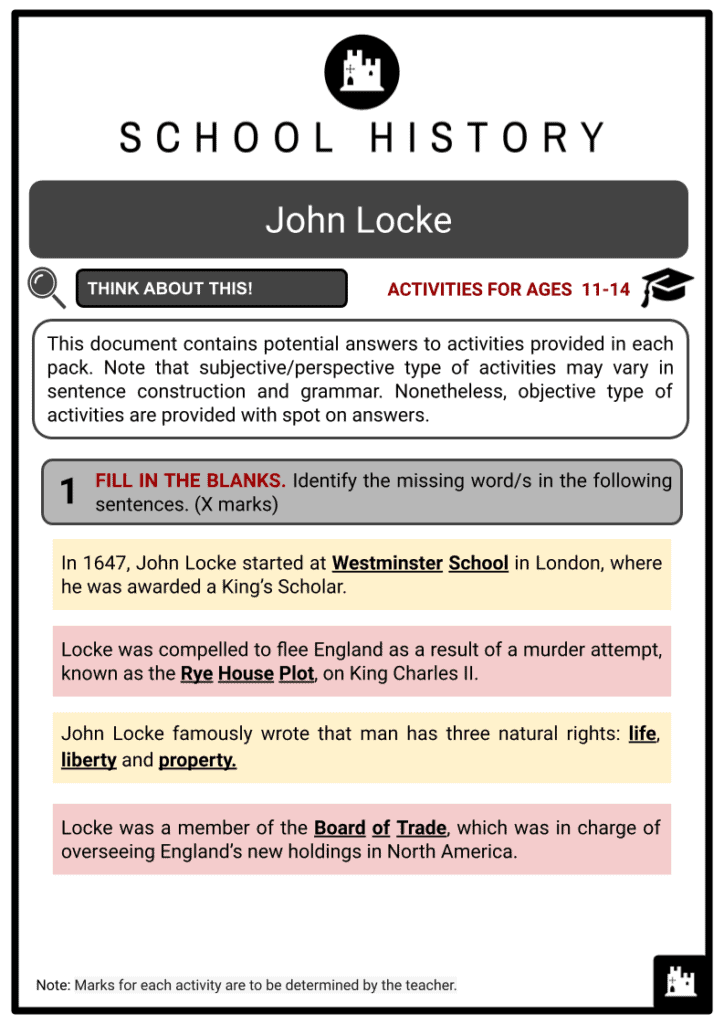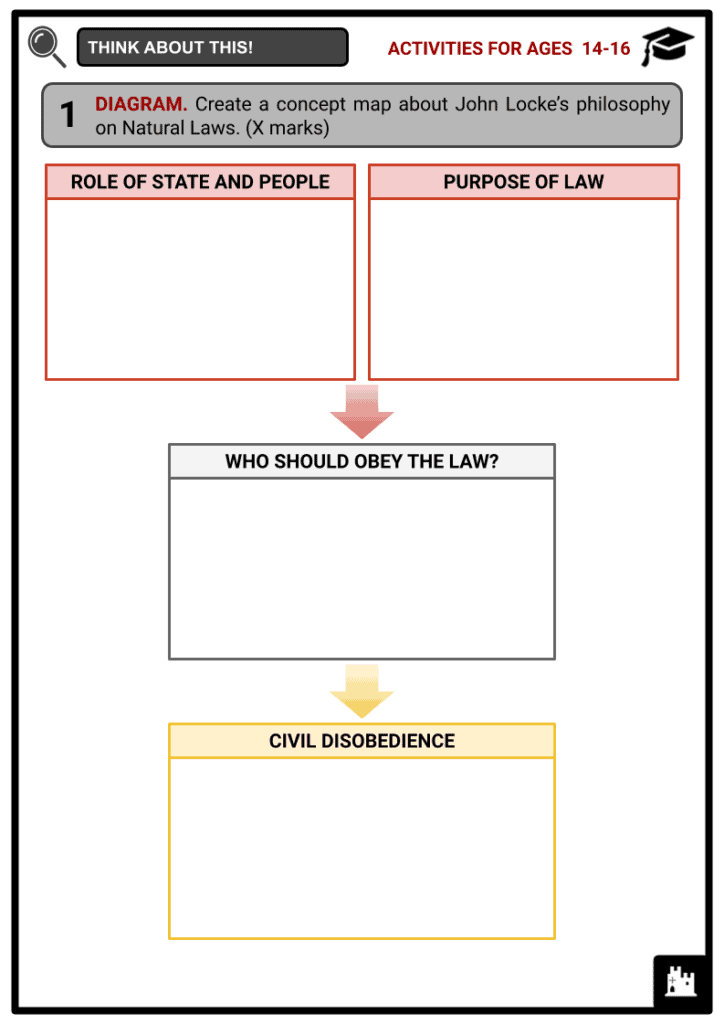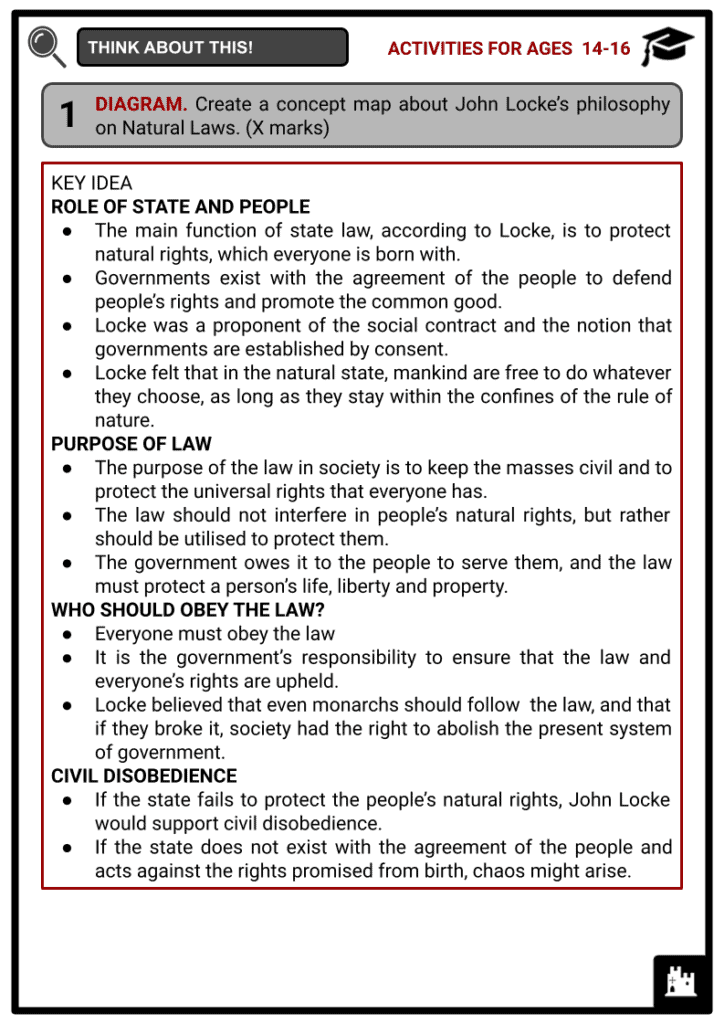John Locke Worksheets
Do you want to save dozens of hours in time? Get your evenings and weekends back? Be able to teach about John Locke to your students?
Our worksheet bundle includes a fact file and printable worksheets and student activities. Perfect for both the classroom and homeschooling!
Summary
- Early Life of John Locke
- Writings and Beliefs
- Legacy and Death
Key Facts And Information
Let’s find out more about John Locke!
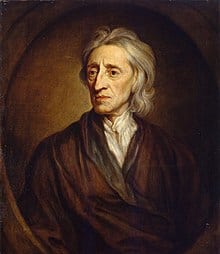
John Locke was an English philosopher and physician who is widely regarded as the ‘Father of Liberalism’ and one of the most significant Enlightenment thinkers. John Locke attended Westminster School and subsequently the University of Oxford’s Christ Church. He studied medicine at Oxford, and it would become a major part of his life. He became a well-known philosopher who wrote on subjects including political philosophy, epistemology, and education. Locke’s writings were crucial to the development of modern Western philosophy.
EARLY LIFE
- John Locke, an influential philosopher, and physician whose writings had a profound effect on Western philosophy, was born on 29 August 1632 in Wrington, Somerset, England. His father was a country lawyer and a veteran of the English civil war, having fought as a captain.
- Locke was raised by Puritans since both of his parents were Puritans. Locke obtained an excellent education as a result of his father’s connections and commitment to the English government.
- In 1647, Locke started at Westminster School in London, where he was awarded a King’s Scholar, a distinction bestowed on a small number of students that paved the way for Locke to attend Christ Church, Oxford, in 1652.
- Locke studied logic and metaphysics, as well as classical languages, at Christ Church, possibly Oxford’s most distinguished institution. After graduating in 1656, he returned to Christ Church two years later for a Master of Arts, which led to Locke taking on tutoring duties at the college after just a few years. Locke was elected a Royal Society fellow in 1668. In 1674, he earned a bachelor’s degree in medicine.
- Locke met Lord Ashley, who would later become Earl of Shaftsbury, during his medical studies. At the time, Anthony Ashley Cooper had been seeking treatment for a liver infection at Oxford. Impressed by Locke, the Earl of Shaftsbury convinced him to go to London and become his personal physician after the two grew close. Locke’s responsibilities increased in tandem with Shaftsbury’s. Locke aided Shaftsbury in both business and politics, and once Shaftsbury was appointed chancellor, he became his secretary.
WRITINGS AND BELIEFS
- The impact of Shaftsbury on Locke’s professional career and political ideas cannot be understated. Shaftsbury imparted a view on rule and administration that never left Locke as one of the founders of the Whig party, which advocated for constitutional monarchism and stood in opposition to the prevailing Tories.
-
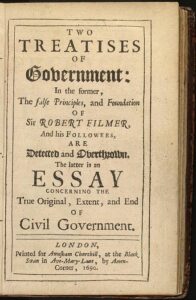
Two Treatises of Government ‘Two Treatises of Government,’ Locke’s seminal work, lays forth his groundbreaking theories on man’s basic rights and the social compact. Both ideas caused a sensation in England, as well as influenced the philosophical underpinnings of the subsequent American and French revolutions.
- As England was on the brink of revolution, Locke became a government target. While historical evidence suggests that Locke was not involved in the event, he was compelled to flee England in 1683 as a result of a botched murder attempt, known as the Rye House Plot, on King Charles II and his brother.
- Locke was exiled to Holland when he wrote ‘An Essay Concerning Human Understanding,’ a four-volume masterpiece that examined the nature of human understanding. Locke’s ‘Essay Concerning Human Understanding’ (1689) laid out a theory of human knowledge, identity, and selfhood that influenced Enlightenment philosophers greatly. To Locke, knowledge was merely the accumulation of ‘facts’ acquired from sensory experience, rather than the finding of something intrinsic or external to the individual.
- Locke proposed a methodology patterned on the rigorous procedures of experimental research to find truths outside the sphere of fundamental experience, and this approach had a significant effect on the Scientific Revolution.
- The essay was published following Locke’s return to England in 1688, just like his Two Treatises.
- His return to his homeland followed the dramatic departure of King James II, who had fled the nation, allowing the Whigs to gain power.
- The ‘Two Treatises of Government’ (1690) presented Locke’s political beliefs, which he developed and improved during his time with Shaftesbury.
- Locke, who rejected monarchs’ divine right, claimed that societies form governments through mutual agreement.
- As a result, if a monarch loses the agreement of the governed, a society may remove him — a strategy that Thomas Jefferson echoed nearly identically in his 1776 Declaration of Independence.
- Locke also devised a concept of property as the product of a person’s work, which would later be used by Adam Smith and Karl Marx to define capitalism and socialism, respectively.
- Locke famously wrote that man has three natural rights: life, liberty, and property.
- The Glorious Revolution of 1688 was a watershed moment in English history, shifting the balance of power from the crown to Parliament. It also made Locke a national hero in his home country.
- From his time at the Westminster School in London, Locke formed certain educational beliefs. At the renowned school, Locke excelled academically, but he did not like his time there. As an adult, he recalled his classmates’ uncivil behaviour and the authorities’ use of physical punishment. In his work ‘Some Thoughts Concerning Education,’ Locke argued that private tutoring was better than public education. It arose out of a series of letters Locke sent to his friend Edward Clarke from Holland regarding Clarke’s son’s education.
- The letters highlight the value of physical activity and academic studies, as well as imparting virtue, knowledge, and good manners. Latin, French, mathematics, geography, history, civil law, philosophy, and natural science were all suggested by Locke. Physical exercise, he claimed, was essential. The text is still considered a classic in the field of educational philosophy.
- Locke’s family belonged to the Church of England, but they were compassionate towards Puritanism. He also demonstrated his religious tolerance when working on ‘The Fundamental Constitutions for the Government of Carolina’ (1669), which guaranteed religious freedom to all except atheists, among other things. Locke’s ‘The Reasonableness of Christianity’ is the most important among his many theological writings. His notion that anybody may find salvation through the scriptures is at the heart of all of them. Locke was always striving to sail a route that would allow people to embrace the core principles of Christianity while maintaining some degree of religious liberty.
LEGACY AND DEATH
- ‘A Letter Concerning Toleration,’ ‘The Reasonableness of Christianity’ and ‘Some Thoughts Concerning Education’ were among the works Locke published after his return to England, in addition to his ‘Essay and Two Treatises.’ Locke, a Whig hero, stayed involved in government issues even in his later years. He was instrumental in the revival of the Board of Trade, which was in charge of overseeing England’s new holdings in North America. Locke was one of the body’s most important members.
- Sir Francis Masham and his wife, the philosopher Lady Damaris Cudworth Masham, sheltered Locke during the last 14 years of his life in Essex. On 28 October 1704, he died there as Lady Damaris read to him from the Psalms.
- Historians are still assessing his influence on Western thinking years after his death. His ideas on separation of church and state, religious liberty, and liberty affected not just European philosophers like Voltaire, a French Enlightenment writer, but also America’s founders, from Alexander Hamilton to Thomas Jefferson.

